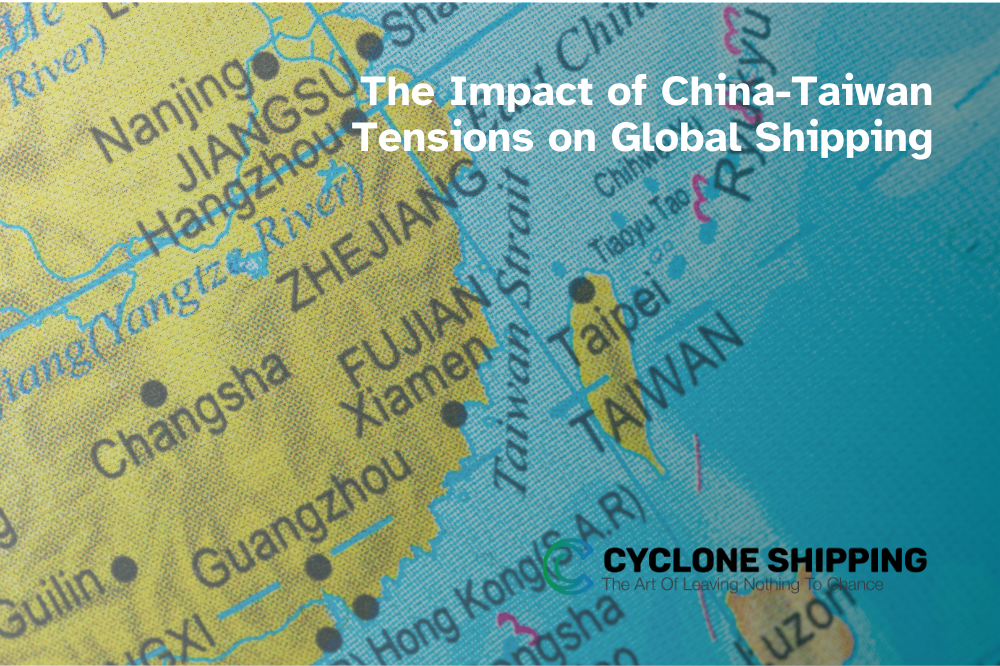Geopolitical issues between China and Taiwan are reverberating throughout the global shipping industry. Businesses that are reliant on efficient logistics and timely deliveries are, naturally, being hit the hardest. China’s recent war games around Taiwan have brought heightened risks, including potential delays, rerouting, and increased freight costs. Understanding these effects from China-Taiwan tensions is vital to help mitigating risks. Working with a freight forwarder is another option.
Understanding the Geopolitical Landscape
China claims not only Taiwan but also the Taiwan Strait, a 180 km-wide seaway that separates the island of Taiwan from the continent of Asia. The strait is one of the busiest shipping corridors in the world. Recently, China has been increasing its military posturing in the area, including naval and aerial drills, which have escalated tensions across the region. These war games have involved missile launches and exercises that encircle Taiwan and are aimed at demonstrating China’s military strength.
The Taiwan Strait facilitates nearly 90% of the largest ships by tonnage globally, serving as a key artery for international trade. Any disruptions here—whether delays due to rerouting or heightened insurance premiums—can create a domino effect on global supply chains. For industries heavily reliant on precise logistics, such as those exporting perishable goods, these disruptions pose significant challenges.
Impacts on Global Shipping
There are several issues related to China-Taiwan tensions, and many mirror similar challenges associated with other supply delays, such as port closures and congestion. Some to consider include:
- Increased Freight Costs: Rerouting ships to avoid military zones or navigating around restricted areas requires more fuel and longer transit times, adding to operational costs. During times of conflict, insurance premiums also rise, as carriers seek to protect their assets from potential risks.
- Delays in Delivery: War games often lead to temporary disruptions in shipping lanes, forcing vessels to navigate around the exercise zones. For time-sensitive goods such as fruits and nuts, these delays can jeopardize freshness and disrupt supply-chain commitments.
- Potential Trade Barriers: Beyond physical disruptions, China has imposed sanctions targeting Taiwan and its allies, including bans on specific imports and exports. For businesses navigating these waters, understanding these regulatory shifts is crucial to avoiding unexpected delays or penalties.
- Economic Ripples Beyond Logistics: Even minor disruptions in the Taiwan Strait could have an effect on global markets. A complete blockade, though unlikely, could severely affect industries worldwide, underscoring the critical role of effective logistics planning.
The Role of Freight Forwarders in Mitigating Risks
Freight forwarders can become an important ally in navigating geopolitical disruptions, ensuring that businesses can maintain supply-chain continuity even during these uncertain times. Here’s how having one on your team can help mitigate challenges arising from the China-Taiwan tensions:
Expert Route Optimization
Freight forwarders specialize in identifying and implementing the most efficient shipping routes. During various types of disruptions, such as military exercises in the Taiwan Strait, they can quickly reroute shipments to safer paths while minimizing additional costs and delays. For example, leveraging alternative ports in nearby regions or exploring air-freight options during critical periods ensures the timely delivery of goods.
Regulatory Compliance
The geopolitical climate often brings changing trade regulations, sanctions, and customs requirements. Freight forwarders stay updated on these changes, ensuring businesses comply with all relevant laws and avoid penalties. For companies exporting perishable goods, this expertise is critical to navigate sudden shifts in import-export policies.
Risk Management and Insurance
Freight forwarders help mitigate financial risks by providing tailored insurance solutions that cover delays, damages, or losses caused by these types of disruptions to the supply chain. A proactive approach allows businesses to focus on their operations without worrying about unexpected shipping costs.
Real-Time Monitoring and Communication
By using advanced tracking and monitoring tools, freight forwarders are able to provide real-time updates on the status of shipments. This transparency allows businesses to adjust their operations quickly, whether due to delays or regulatory changes, ensuring better planning and fewer disruptions.
Specialized Services for Perishables
For industries such as fruits and nuts, freight forwarders offer temperature-controlled shipping solutions and expedited customs clearance processes to maintain the quality of goods. Their experience in handling time-sensitive products reduces the impact on freshness and delivery times, even during geopolitical disruptions.
Global Networks and Partnerships
Freight forwarders often operate through vast networks of carriers, ports, and regulatory agencies. This allows them to secure space on alternative shipping routes and negotiate favorable terms, even during periods of high demand caused by rerouting or increased risks.
Proactive Steps for Businesses
To minimize the impact of China-Taiwan tensions on your operations, consider these strategies:
- Diversify Shipping Routes: Relying on a single trade corridor, such as the Taiwan Strait, increases vulnerability. Work with your freight forwarder to explore alternative routes and modes of transportation.
- Build Buffer Times into Schedules: Anticipate potential delays by allowing extra time for shipments, particularly during periods of heightened tensions.
- Strengthen Inventory Management: Stocking additional inventory in key markets can reduce reliance on just-in-time deliveries, safeguarding against unexpected disruptions.
- Leverage Freight Forwarder Expertise: Collaborate with a trusted freight forwarder to access the latest insights and tailor solutions to your unique needs.
Looking Ahead
The China-Taiwan tensions highlight the importance of resilience and adaptability in global supply chains. While geopolitical challenges may be beyond a business’s control, partnering with an experienced freight forwarder provides the tools and strategies to navigate these complexities.
By optimizing routes, ensuring compliance, and managing risks, a freight forwarder such as Cyclone Shipping is an essential ally for businesses aiming to maintain efficiency in uncertain times. For industries that ship perishable items, timing and quality are paramount, making such a partnership a requirement.
If your business is seeking a reliable logistics solution, Cyclone Shipping is a strategic partner who can help weather the storm. We will help your business to adapt, thrive, and stay ahead in a rapidly evolving global market. Learn more here.




